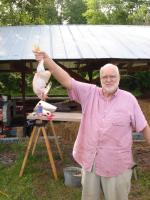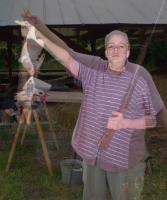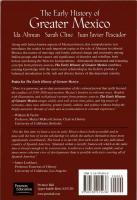Before I get to the main matter of this post, here’s a reflection on the mysterious nature of heredity.
From the Whiz-Bang Automated Chicken Plucker post, here’s my father, triumphant with chicken:

From the Kill the Wabbit post, here’s my son, triumphant with rabbit:

Here they are superimposed (thanks, Charlie):

Weird, huh?
Now to business. Morgen, who is Starling Lawrence’s assistant, has emailed me to ask 1) how many copies of the bound galleys would I like? and 2) can I think of anyone who would write a blurb for the back cover?
This means that I’ll be seeing the “page proofs” (the first printout of the typeset books) in a few weeks. They’ll show up here in a big pile of loose sheets, two pages on each sheet (when they come, I’ll post a picture), and I’ll read through them for mistakes. Generally the page proofs are riddled with errors, anything from misspellings to missing paragraphs. I’ll mark all the mistakes and send them back.
This will also be my last chance to change any of the text. My text changes (as opposed to the typesetting errors) can’t amount to more than 1/10 of the manuscript, or Norton will start charging me a fee for each page I alter. Each change, after all, means that the typesetter has to go back through and redo the pages, and late additions can shift a lot of pages forward. The fee is meant to keep authors from rewriting the book when they see it in page proofs. This is always a temptation–the book always READS so differently when it shows up in page proof form. Don’t ask me why.
Anyway, even though the page proofs have errors in them, while I’m reading my set, Norton will be binding up a few hundred (or so) copies of the page proofs with plain brown covers. These look like paperback books, and instead of a back cover they usually have advertising copy. They go out to reviewers at the major magazines and journals; these reviewers generally need to turn in their copy weeks and weeks ahead of time, and Norton wants reviews to come out as close to the publication date as possible. (Of course, the reviewers are all reading error-riddled copies. But they’re used to that.)
The galleys also go out to anyone famous or semi-famous that might be willing to write a blurb for the back cover, which is still in design.
This is a bit of a problem, actually. When I started on this project, a historian friend of mine told me, “Historians are going to hate the chapters that deal with their particular field, and think that the rest of it is pretty good.” Judging from the various comments I’ve gotten back from expert readers, he’s absolutely right. Experts always feel that a brief treatment of their specialty is missing all of the important subtleties and leaves out absolutely vital information.
So I’m not sure the book should go to, say, famous historians of ancient Rome (not that I can think of any). I asked Morgen if she could come up with any names, and here’s the list she sent me:
Malcom Gladwell
Simon Schama
Louis Menand
John McPhee
Nathaniel Philbrick
David McCullough
Thomas Cahill
Jared Diamond
Doris Kearns Goodwin
And then I suggested Thomas Friedman, Robin Waterfield, Mark Noll, and Steven Pressfield.
I’m actually not sure whether ANY of these endorsements would help sales. None of my other books have been blurbed, and when I talked to Star he said that a history like this probably wasn’t going to sell because of a blurb on the back. It’s more likely to help with novels.
Just for your reference, here’s a random book cover showing the kind of thing we’re talking about (click on it for a bigger view):

So my two questions for you, Gentle Readers, would be: If you were going to buy a history of the world, would you look for blurbs on the back cover? And if so, what names would YOU suggest?
Hubby would have you send a copy to William McNeill , who wrote his own History of the World decades back, also hubby’s high school textbook, amoung other hisotry books. Note sure if he is still with University of Chicago… he has other books, too, published by norton 🙂
There are some great ancient history professors in the UTexas classics dept. Some that come to mind: Tom Palaima & Lisa Kallet (Grk) and Karl Galinsky & Gwyn Morgan (Rome).
I would look for blurbs and check out who the author is and who wrote the blurbs. A decent blurb by a good scholar is, in my opinion, better than an outstanding blurb by a non-scholar.
I really enjoyed Victor Davis Hanson’s books. His web site is here:
http://victorhanson.com/
I think I have an email address for him if you are interested.
McCullough, Cahill, and Noll would be great. Other suggestions: David Brooks (N.Y. Times columnist), Bill Bryson (A Short History of Nearly Everything), and perhaps Kenneth C. Davis (Don’t Know Much About… series). Granted, these might be more on the “pop” side of history, but if the goal is book sales (and I’m guessing Norton says it is), they might be considerations.
As a fellow writer and homeschoolers, I enjoy your blog and appreciate your work.
I know that this is probably not where you or Norton is headed, but I would probably look favorably on endorsements by homeschooling luminaries: Douglas Wilson, Rob Shearer, Diana Waring, even Mary Pride or Cathy Duffy. I think most of us “commoners” are unlikely to be familiar with most of the names you and your publisher came up with. Actually, I looked back to your post, and I do know of about half of them, but I don’t know if I would like a book that any of them recommend.
I do know YOUR books, however, so I’m sure I’ll be buying a copy of your history as soon as it hits the bookstores.
What about Robert Wilken over at UVA? He’s got several books of interest to the time periods you’re covering . . .
I don’t know your field well enough to name names, but when I’m buying books, I *definitely* look at blurbs. Especially in my own field. I don’t take what they say very seriously, but I take seriously the fact that they’re willing to have their name on someone else’s book. Who does the blurbing tells me a lot more about the book than what they blurb.
Plus, I find that books I really, really like draw from the same pool of blurbers. So when I see those blurbers, I feel more confident that it’s a book worth my while. In that vein, Thomas Cahill blurbing a book might induce me to buy it . . . uh, get it out of the library, actually. (Sorry. Grad student.) Maybe Mark Noll, too. Thomas Friedman, not so much. (His writing annoys me.)
Well, I am weighing in here representing the portion of your client base who is ignorant of all the names mentioned so far above. I tend not to even read the blurb, to be honest. Are there blurbs on TWTM? Or the SOTW weries? If so, I missed them. I think published reviews are better than blurbs. A person has to pick up your book in the first place to read a blurb on back. But it is response to a review that many a potential buyer might do this.
I do not know enough about history writers to stroll right into a book store and browse confidantly through the History and Sociolgy section. But, armed with a title and author (after reading a review that recommended said author and title) I would be much more likely to march in, pour over the shelves until I found it, and take it to the cashier.
Well, I’m a homeschooling mom and I always read the blurb on the backcover. The names Sherry mentioned would have my attention, too.
Finally, how about a blurb of recommendation from the WTMoms!!! 🙂
Bill Bryson came to mind too, not because he’s one of the pop historians, but because he’s a polymath rather than an expert in a narrow field, which is what you’d probably want for an exercise like this. What about Mark Kurlansky? Or Rebecca Rupp, if you’re going more for the hs market…
I’m not sure if it would do anything for sales, but Peter Stearns is one of the most eloquent and influential advocates for world history among historians. Someone else to consider, perhaps more for the later volumes, would be Wilfred McClay, a Christian homeschooler and first rate historian of American history.
Like some have already posted, many of the history-expert names thrown out for blurbs are not ones I recognize. And when buying a book, I am rarely influenced by the blurbs — I am more influenced by reading reveiws, hearing reviews on NPR and personal recommendations. However, PariSarah had a great point — I wonder who *my* favorite authors are stumping for? I may have to start paying a bit more attention. =)
With your (imho) solid reputation among homeschoolers, I think it would be of greater marketing benefit to woo history readers with blurbs from those they know and love, rather than to use several blurbs from the homeschooling world. Even though it irks me to say it, I find that people in my social circles don’t read “homeschooling” texts, even when there is much more broad appeal potential.
David McCullough
Hands down. He would win me over, as I really enjoy his writing.
He also is fairly well known among people who read history for “fun” so to speak.
I would also have to say David McCullough. I’m kind of laughing at myself because he’s the only author in the list I recognize! I read John Adams and absolutely loved it–I was sad to be finished with it. I know others who are fans of his books–I think he has quite a following. So, considering that he was the most recognizable author at least to me, and the fact that I know several others who love his work, I would think that he’s a good bet!
How about Rufus Fears, Elizabeth Vandiver, and some famous Homeschool History curriculum providers like Marcia Sommerville (TOG) ?
I like all the suggestions so far, especially David McCullough. But someone who wasn’t on the list was Tom Holland. He is a first-rate historical writer and Cambridge grad. I like his books “Crossing the Rubicon” and “Persian Fire” (yes, I know book titles are supposed to be underlined, but this box won’t let me!).
A blurb might not sell a book, but it can be can be significant in a decision to purchase. How about Lauren Winner? I read a couple of American History tomes because I read about them in Girl Meets God.
Hi–this is my first posting . . . up until now I have just enjoyed reading your blog entires, but I had to add my two cents when it comes to the back cover of the book!
When out book shopping (my absolute favorite passtime as a homeschooling mom/voracious reader), I always check the back of the book for reviews, and I tend to be impressed only if I recognize the names of those who offer the praise. David McCullough is definitely a must-have for a history book, as are the more widely published professors. And even non-history buffs will recognize Doris Kearns Goodwin’s name because of her many stints on the evening news–kind of a celebrity touch!
Susan Wise Bauer has a blog! My scholars have so enjoyed your Story of the World books. We home educate our 11 children and they use your books at their homeschool center.
I just purchased “A Patriot’s History of the United States” by Larry Schweikart and Michael Allen for my husband. The back cover contains an excerpt from the Introduction and the tone and example of fine writing is what caught my eye.
Didn’t Doris Kearns Goodwin have a plagiarism issue recently?
Love the superimposed photos! After studying Annie Oakley and her times for a Chautauqua performance, my 13 year old daughter is begging for hunter safety classes. ;~)
I’m definitely influenced by blurbs. Simon Schama! Yay!
David McCullough definitely. Thomas Cahill, Robin Waterfield and 2 highly persons credentials would be sufficient. I tend to look for credentials when selecting non-fiction.
I don’t think they are necessary myself, but you do have some competition on the market and it wouldn’t hurt.
I’m prepurchasing this book at Amazon. Thank you for your work.
I will chime in for David McCullough also. And although I hate to say it, Bill Bryson IS a recognized name. I agree with your reservations about history specialists, but what about history “apologists?” Surely there are some prominent History types who lament the lack of awareness of history in general . . . and what about people who write other history overviews? And I also sort of cringe about this, but what about someone like Bill Bennett?
I agree with the homeschoolers who won’t recognize many of the history experts but would pay attention if a person such as Doug Wilson or Cathy Duffy were on there. But that may not bring out the largest segment of your market.
I also agree with the idea of leaning toward reviews rather than individual blurbs. I am quite influenced by reviews on the back of a book.
So, to sum up, what about a mixture of a history expert or three (David McCullough would be AWESOME), a review or two, and possibly a homeschooler with wide appeal like Cathy Duffy?
Hope this helps,
Sherrill
P.S. Take heart. It is sometimes a good thing not to be easily categorized. G’s advisor was very worried about G finding a job because he fell inbetween two fields of study, but it was the precise reason he was pursued by the great company we have the offer from!
McCollough, Bryson and Cahill were the first to come to my mind as well. Dh also recommended James McPherson, author of “Battle Cry of Freedom”.
Can’t wait to read the book!
Blessings,
LA
I don’t have a recommendation for a name, but how about someone somewhat academic, but also known? If I understand right, this would be reading for the average improperly educated high school or college graduate, right? And not just homeschoolers. Someone more people know.
Another vote for Victor Davis Hanson and David McCollough. I second the idea that homeschoolers will probably already know your name (and either be lined up at midnight to buy the book or have decided that it is to restrictive to bother with).
I loved Cahill’s book on the Irish (though I had to look the book up to make sure of the name).
What about James Billington (Librarian of Congress)? E. D. Hirsh?
Ken Burns? Tom Brokaw (I’ve been out of the US for a couple years and I’m thinking that at least a few of these suggestions might be dead. – Although if you could still get a blurb from them it would be really impressive, wouldn’t it?) Tom Hanks or Stephen Spielburg (thinking of their work with WWII and Hank’s history of spaceflight). Elizabeth Peters (Egyptologist and mystery writer)?
What about the heads of major museums? Smithsonian, Metropolitan Museum of Art? The names might not be well known but the titles would be. And a review copy might encourage them to feature the books in the museum shops.
Definitely —Another vote for Victor Davis Hanson and David McCollough! And Thucydides would be nice. 🙂
I like to read blurbs. Can’t wait to see the book! I’m reading Kitto’s The Greeks right now.
Like some of your other commenters, I like to read blurbs to get others’ perspectives. How about Thomas Sowell? Or I also like the idea of a blurb from a homeschool luminary.
Hey, I’ll write a blurb for you. 🙂
I have to second Tomas Sowell (although it may make it to ‘political’) and David McCollough.
Hey! My favorite blurb ever was Bono’s mention of Eugene Peterson’s The Message Bible… they should have put him above Mark Lowry on the back. (Could you get Bono? Could you?) Okay, I’m staying mainstream with a vote for McCullough, someday I will read John Adams. Tonight I am so BLESSED just to know there are other reading homeschooling moms and dads out there. This blog is great fun though no one will ever read my comments!
Try to get your book to Don Imus. When he talks about an author, and he has Doris Kearns Goodwin and Michael Beschloss on all the time, their books always go soaring on the best-selling list. His guests are always thought provoking and leading edge.